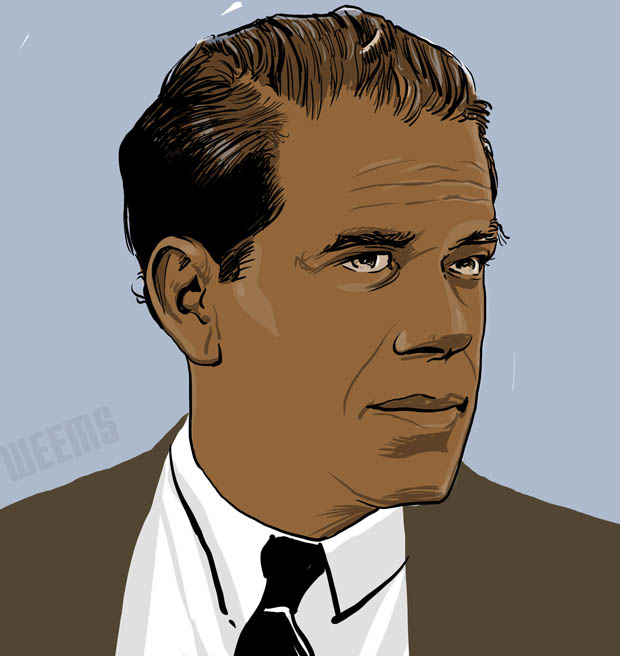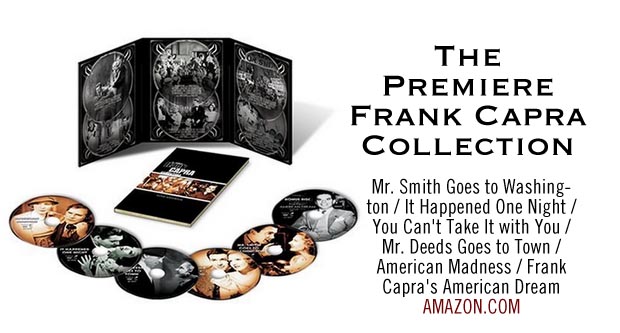It Happened One Night - 1934
"I'd change places with a plumber's daughter anyday."
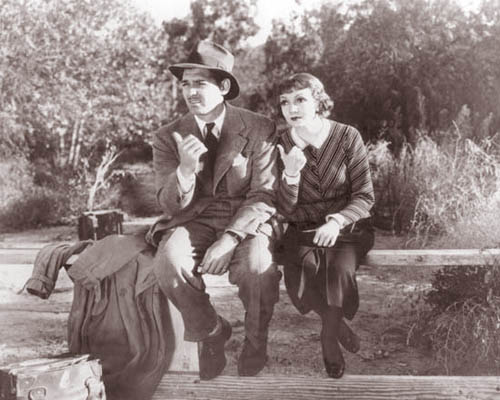
ELLEN ANDREWSis a headstrong rich girl, running from her millionaire father after she hastily married a celebrity aviator. Peter Warne is an out-of-work reporter who spots Ellen hiding out on a long distance bus trip, trying to make it to New York City from Miami without being caught by her father's private detectives. Contempuous of Ellen's snobbery and childishness, Peter is also pitious over her naivity on the road, and makes a deal to help her get to her husband in exchange for an exclusive story. Peter teachs the sheltered rich girl about survival on the road, and she teaches him more valuable lessons about the heart.
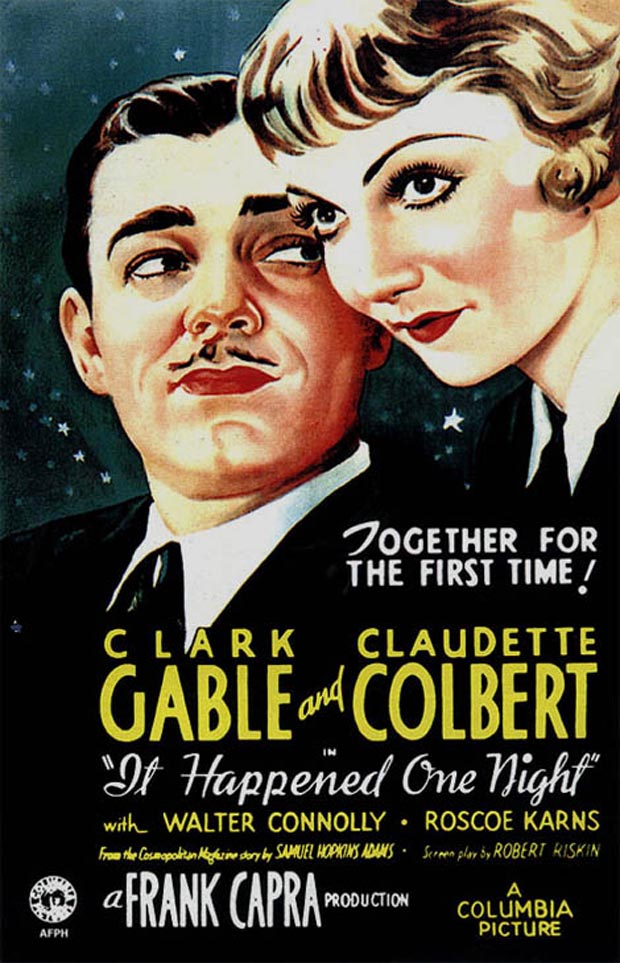
"...it is better than it has any right to be - better acted, better directed, better written."
From the New Republic Review 1934
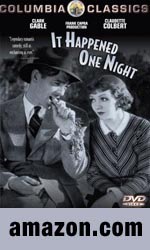
Contemporary Reviews:
1934 Review of the film from the New Republic Magazine
1935 Review of the film from The Nation Magazine
About It Happened One Night
"...I didn't envy or scorn Irving Thalberg. Like everybody else I fell in love with him – and he with me. From the dozen scripts he had me read, I chose Soviet, a strong meladrama about an American engineer hired to build a super dam in Russia. Thalberg promised me a "dream" cast: Wally Berry, Marie Dressler, Joan Crawford, and Clark Gable – wow!
Nearing Soviet's starting date, frail Thalberg had to go to Europe for health reasons. Left in sole command, Mayer couldn't wait to harpoon Thalberg's pet projects. He canceled Soviet, sent me packing back to Columbia, but he still honored Cohn's bonus and loan-out of MGM's stars. Without Mayer's hatred there would have been no It Happened One Night. " (From Capra's book The Name Above the Title.)
Capra chose "Night Bus" from a stack of story possibilities after finishing Lady For A Day. No one in his crew at Columbia had much faith that the story would make a very good film, and Capra had to convince everyone, including Columbia chief Harry Cohn, to let him do the film. Finally when filming was to begin, Capra panicked and tried to stop the film, but by then Cohn had arranged too much to stop production, so it went ahead.
Capra's first choice for the male lead was Robert Montgomery, but the loan was refused from MGM who had him under contract. Instead, Louis B Mayer sent Clark Gable over in an effort to chastise Gable for making demands for better money. At that time, Columbia was still considered something of a "poverty row" production facility. At first Gable was cold and disinterested in the filming, but through Capra's enthusiasm and the enjoyment of the close-knit Columbia crew, Gable became ardently involved.
Myrna Loy was asked to play the female lead, but refused it after reading an early script draft (Loy later remarked that the finished picture bore little resemblance to the story she had turned down.) After Loy, Miriam Hopkins and Margaret Sullivan each turned it down. Constance Bennett wanted to, but only if she could produce it herself. Then Bette Davis wanted to, but RKO wouldn't allow her, who had her under contract than. Harry Cohn interested Claudette Colbert by offering her $50,000. She had worked with Capra in 1927 on the silent For The Love Of Mike, in which the pair got along very poorly.
In the original story, Peter Warne was an out-of-work Chemist. In the early drafts, Capra changed him to a highbrow artist. Myles Connolly, a long-time Capra co-writer, suggested making him a hard-boiled newspapermamn, "one of us." A character with that occupation had appeared in the Robert Riskin scripted, Capra directed Platinum Blonde in 1931. Indeed, in the Pat McGilligan introduction to Six Screenplays by Robert Riskin, he disputes Capra & Connolly's administering the crucial change in the lead character, but suggests that Riskin must have played a more important role.
The
success of It Happened One Night changed the careers
of both Capra, and its screenwriter, Robert Riskin. "He
and Capra extracted unusual freedoms at Columbia. Unlike most
of the studio's contract employees, they were allowed to work
off the lot, usually at Riskin's place or Capra's house. After It Happened One Night, they made a habit of convening
at their lucky place, where they had brainstormed 1934's Oscar-winning
Best Picture, the La Quinta Hotel, in the desert some twenty
miles from Palm Springs." (Six Screen Plays by Robert Riskin from the Introduction by Pat McGilligan, University
of California Press, 1997.)
It Happened One Night broke the house records at Radio City Music Hall in February, 1934. Overall, the film brought in over $1 million in rental fees for Columbia in it's initial release. The total production cost on the film was $325,000.
The film won Academy Awards for best picture, director, actor, actress and story.
A remake was done in 1956 as a musical, titled You Can't Run Away From It.
(SIX SCREENPLAYS BY ROBERT RISKIN and Joseph McBride's FRANK CAPRA: THE CATASTROPHE OF SUCCESS figures greatly in compliling the facts I've put together here. To read about these books, go here.)
IT
HAPPENED ONE NIGHT
1934
Produced and Directed by Frank Capra. Script by Robert Riskin. From the story "Night Bus" by Samuel Hopkins Adams. Cinematographer: Joseph Walker. Length: 105 minutes.
Cast: Clark Gable, Claudette Colbert, Walter Connolly, Jameson Thomas, Roscoe Karns.
Release Date: 23 Feb 1934
Premiere Information: New York opening: 22 Feb 1934
Production Date: 13 Nov--22 Dec 1933
retakes 8 Jan--12 Jan 1934
Color: Black and White
Sound: Mono (Western Electric Noiseless Recording)
Duration (in mins): 105 mins.
Duration (in feet): 9,431
Duration (in reels): 11
Alternate Title: Night Bus
Distribution Company: Columbia Pictures Corp.
More info coming
Original page 2001 | Updated April 2013
